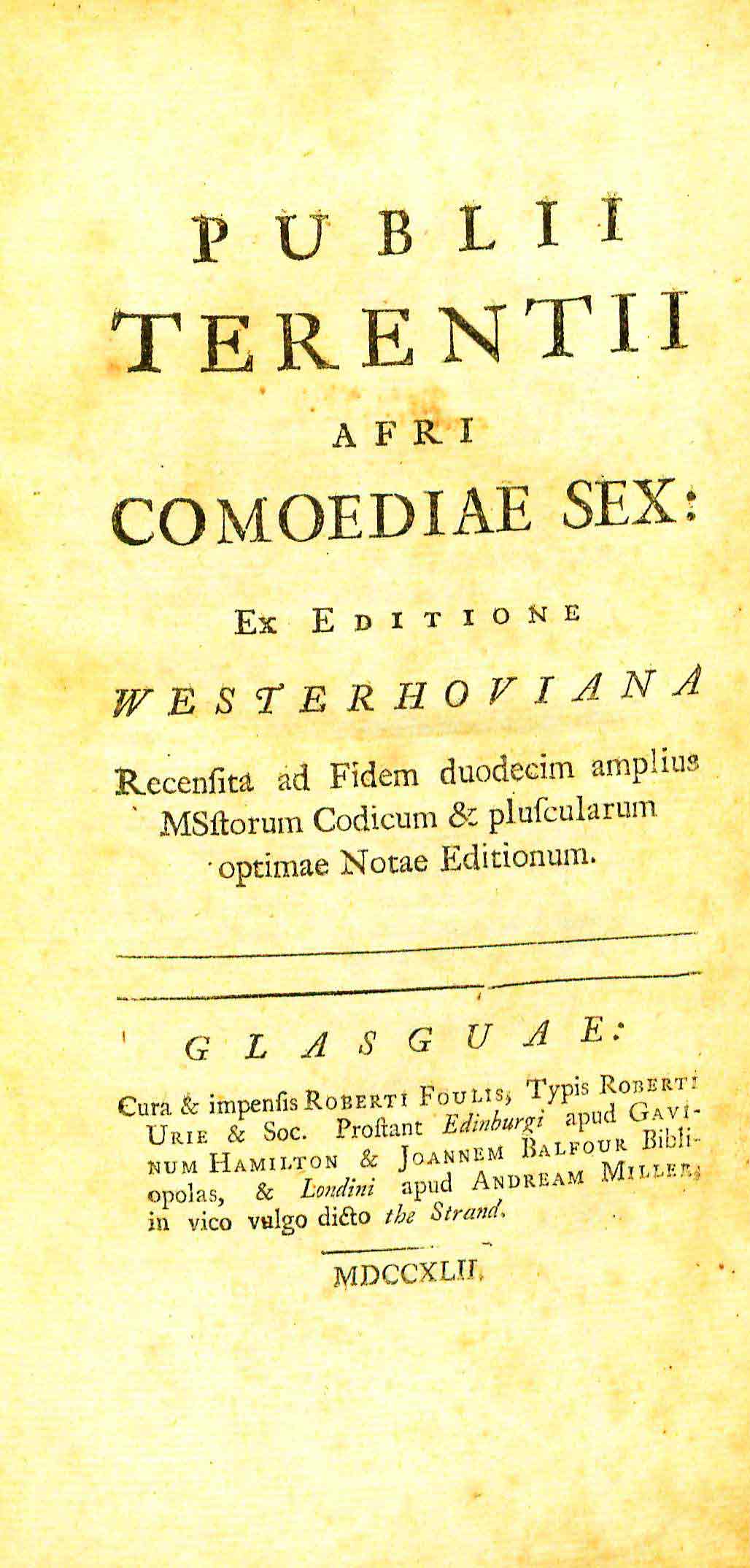Publii Terentii Afri Comoediae Sex
by Terence
| Publii Terentii Afri Comoediae Sex | |
|
Title page from Publii Terentii Afri Comoediae Sex, George Wythe Collection, Wolf Law Library, College of William & Mary. | |
| Author | Terence |
| Editor | Arnoldus Henricus Westerhoff |
| Published | Glasguae: Cura & impensis Roberti Foulis, typis Roberti Urie & soc. |
| Date | 1742 |
| Language | Latin |
| Pages | 280 |
| Desc. | 8vo (19 cm.) |
| Location | Shelf L-2 |
Publius Terentius Afer (195/185–159 BCE), "Terence," was a Roman comedic writer. The limited information known about his life comes from a biography by Suetonius and commentary by Donatus, but neither source can be confirmed as entirely accurate.[1] Terence was born in Carthage and went to Rome as a slave in a senator’s household. He was soon freed and eventually patronized by prominent Romans.[2] Terence himself speaks in his works with pride about his support by Cornelius Scipio Africanus, the great Roman general from the Second Punic War.[3]
Like Plautus, Terence used original Greek comedy as inspiration for his works, but he followed them more closely and kept the settings and topics Greek rather than changing them to fit a Roman theme. Terence attempted to create more natural and realistic Latin plays with more dialogue and no prologues, instead putting key background information into the actions and dialogue itself.[4] He consequently was a key developer of literary Latin with a more every-day, conversational tone.[5] Though Terence was not widely appreciated by the Roman public, his works were admired by critics such as Cicero and Horace.[6] All six of Terence's plays are extant: Andria (‘Girl from Andros’), Hecyra (‘Mother-in-law’), Heauton timorumenos (‘Self-tormentor’), Eunuchus (‘Eunuch’), Phormio, and Adelphoe (‘Brothers’). [Ibid.][7] This work, which includes all six plays, was published by the well-known and highly regarded Scottish publishers Robert and Andrew Foulis.
Evidence for Inclusion in Wythe's Library
George Wythe refers to Terence in his case reports for Overton v. Ross: "The judge of an equitie court, who, by this precedent, is referred to the practice of common law courts, in awarding new trials, to learn in what cases he will be justified in abrogating awards, if he shall, for that purpose, consult those oracles, will probablie be declaired, distracted, mislead, disappointed, as in Terentii Adelphi, act' 4, Scen' 2, old Demea was by the distraction of his servant Syrus, and, in like manner, be derided for his simple credabilitie."[8] A second reference to Terence comes from a letter Thomas Lee Shippen wrote to his father describing his course of study while reading law under Wythe at the College of William & Mary, "...or read some entertaining book in french or amuse myself by recurring to some favorite author Horace, Virgil and Terence."[9] We do not have enough information to verify if Wythe owned any works by Terence or what those works may have been. The Brown Bibliography[10] suggests Wythe owned either Publii Terentii Afri Comoediae, Phaedri Fabulae Aesopiae (1726) based on a copy Thomas Jefferson sold to the Library of Congress'[11] or Publii Terentii Afri Comoediae Sex (1742) based on a copy Jefferson listed in his manuscript catalog. Brown favored the latter version due to Wythe's preference for classics published by the Foulis Press. The Wolf Law Library agreed with Brown's reasoning and purchased the 1742 Glasgow edition of Publii Terentii Afri Comoediae Sex.
Description of the Wolf Law Library's copy
Rebound in modern half gray morocco and marbled paper-covered boards with black leather spine label gilt. Purchased from Between the Covers-Rare Books, Inc.
Images of the library's copy of this book are available on Flickr. View the record for this book in William & Mary's online catalog.
See also
References
- ↑ "Terence” in The Oxford Companion to Classical Literature, ed. by M.C. Howatson (Oxford: Oxford University Press, 2011).
- ↑ "Terence” in Oxford Dictionary of the Classical World, ed. by John Roberts (Oxford: Oxford University Press, 2007).
- ↑ "Terence” in The Oxford Companion to Classical Literature.
- ↑ Ibid.
- ↑ "Terence” in Oxford Dictionary of the Classical World.
- ↑ "Terence” in The Oxford Companion to Classical Literature.
- ↑ Ibid.
- ↑ George Wythe, "The Case of Overtons Mill: Prolegomena, in the Richmond Common-Law District Court, Elizabeth Overton and Richard Overton, plaintiffs, against David Ross, defendent" (Richmond, VA?: s.n., 1803?), 5.
- ↑ Letter from Thomas Lee Shippen to Dr. William Shippen, Jr. N. P. (Williamsburg) February 19, 1784.
- ↑ Bennie Brown, "The Library of George Wythe of Williamsburg and Richmond," (unpublished manuscript, May, 2012) Microsoft Word file. Earlier edition available at: https://digitalarchive.wm.edu/handle/10288/13433
- ↑ E. Millicent Sowerby, Catalogue of the Library of Thomas Jefferson,(Washington, D.C.: The Library of Congress, 1952-1959), 4:549, [no. 4576].
